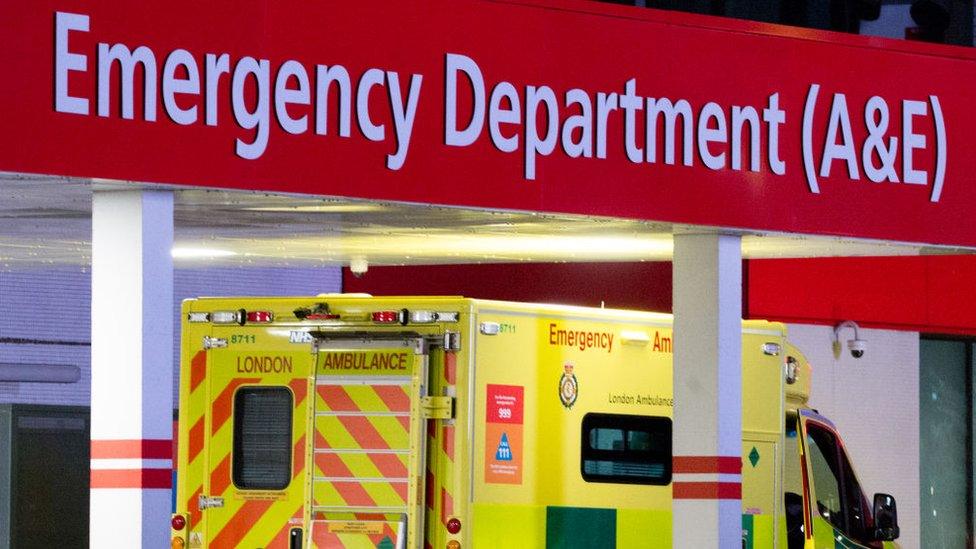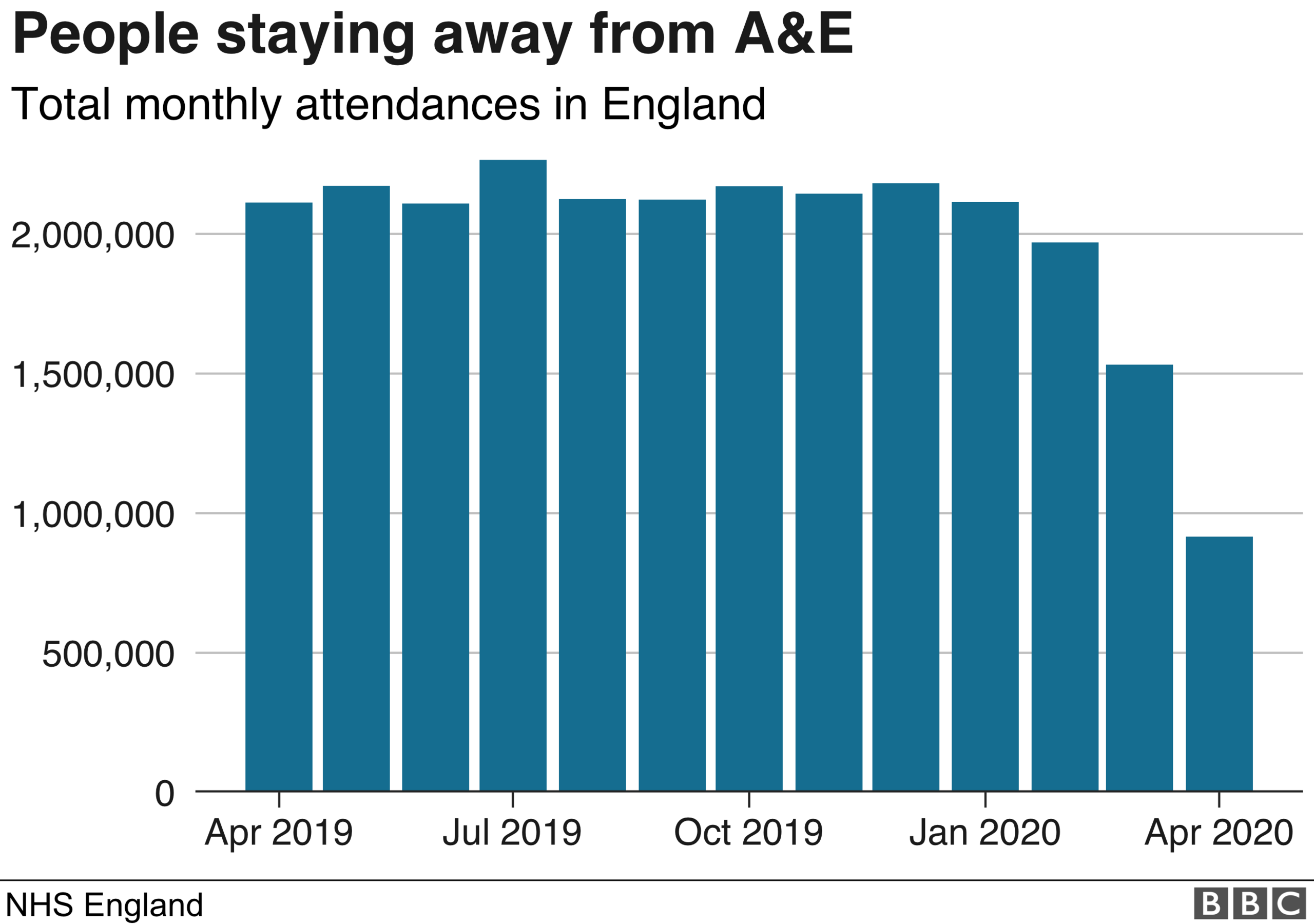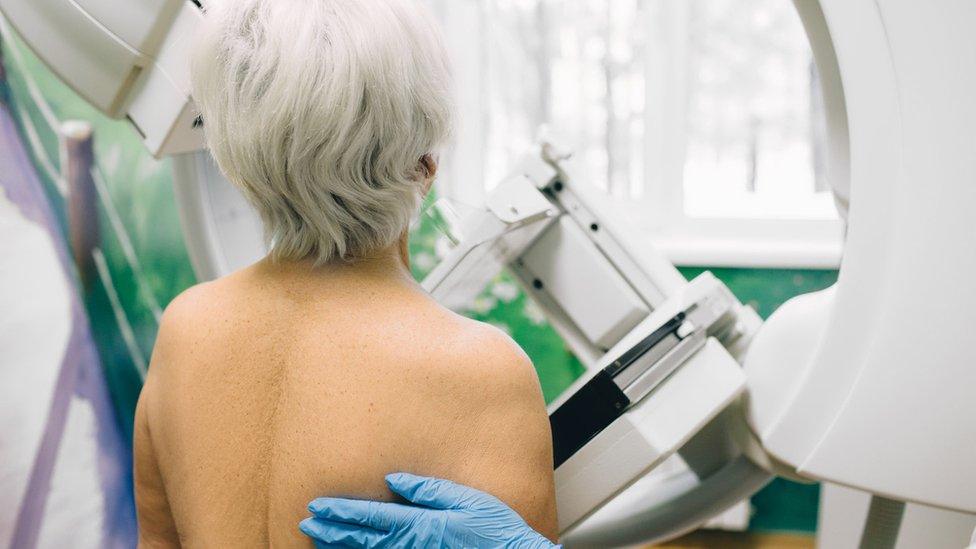Coronavirus: A&E visits in England down to record low
- Published

A&E visits in England have halved since the coronavirus outbreak started, dropping to their lowest level since records began.
Before the pandemic, about two million patients a month were visiting A&E but in April that dropped to 916,581.
NHS bosses are concerned seriously ill patients are being put off seeking treatment.
Drops in cancer referrals and routine operations were also seen as services were scaled back and staff redeployed.
Health experts said it could take months to get the NHS back to normal and tackle the backlog.

'Come forward for urgent care'
The drop in A&E visits - to just above 900,000 in April - was the lowest since records began in 2010.
Before the coronavirus outbreak, more than 2.1 million patients a month were visiting A&E. In March that dropped to 1.53 million.
There is particular concern that patients who have suffered strokes and heart problems have stayed away because of fears over coronavirus.
NHS England clinical director for stroke Dr Deb Lowe said she and her fellow doctors were "really worried" that the numbers seeking help for stroke care had gone down.

Breast screening is just one of many ways of detecting cancer
Data for other areas lags a month behind - so for routine treatments and cancer care NHS England has only been able to publish the data for March. Lockdown was announced in late March.
GPs made 181,873 urgent cancer referrals during March - down from 196,425 on the same month in 2019.
The number of patients admitted for routine surgery and treatment, such as knee and hip operations, dropped by a third to 207,754, down from 305,356 in March 2019.
Hospitals were told to start stopping routine care to free up beds for the coronavirus peak.
At the end of last month Health Secretary Matt Hancock urged hospitals to re-start routine treatments - guidance has now been updated advising patients to isolate for two weeks before going in for surgery
Meanwhile, community services have had to be scaled back as staff have been redeployed and face-to-face contact has had to be restricted.
Health visitors, for example, have been having to carry out most of their consultations with new mothers via phone or using video technology.
Macmillan Cancer Support chief executive Lynda Thomas said despite urgent cancer care being prioritised during the lockdown, services were still affected, while she fears some patients were put off seeking help.
"Cancer must not become the forgotten 'C' in this pandemic."

A SIMPLE GUIDE: How do I protect myself?
LOOK-UP TOOL: Check cases in your area
MAPS AND CHARTS: Visual guide to the outbreak

Three leading think tanks - the Nuffield Trust, King's Fund and Health Foundation - said restoring services was going to take time.
They warned staff were exhausted because they had been working flat out and needed time to recover.
The availability of protective kit, such as aprons and goggles, would need to be improved and expanded, while changes would need to be made to allow for social distancing and extra cleaning.
What is more, capacity would still need to be set aside for a second peak.

HOSPITAL SPECIAL: The human stories behind the headlines
JESSE LINGARD'S HOME WORKOUT: Can you keep up?

The NHS is expected to use the space at the 10 field hospitals - known as Nightingales in England - to provide some of this. Only two of them are currently being used.
Nuffield Trust chief executive Nigel Edwards said: "With the virus still at large there is no easy route back to the way things were before.
"Unfortunately that will mean people waiting much longer and some services being put on hold."
